|
Bob Wills and His Texas Playboys were without doubt
the best-known band in the history of Western Swing and
was one of the very few bands to continue performing this
once highly popular dance style music well into the 1970s.
The heyday of this fantastic big band sound reached its
peak directly after the Second World War. By the mid 50s,
this era had all but virtually ended.
Bob Wills was born (James Robert) near Kosee, Texas
in 1905. His father (locally 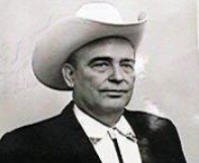 known
as Uncle John) was a fiddle player of local repute and the
young Jim Bob learnt to play fiddle and mandolin essentially
to accompany his father at the square dances he played.
For a while it was thought that Bob would become a preacher,
but he worked for a time as a farmer and then a barber.
In 1929 Bob started out as a black-faced comedian in one
of the travelling medicine shows of the time. Making the
acquaintance of guitarist Herman Arnspiger, the pair formed
the Bob Wills Fiddle Band, playing at local dances and parties
and even recorded two songs for Brunswick in Dallas, which
were not released. The duo became a quartet when Milton
Brown (vocalist) and his brother Durwood (guitarist), joined
the group in 1930, though Durwood was still at school at
that time. The band played for dances and had spots on the
radio with KTAT and KFJZ in Fort Worth, after receiving
sponsorship from the Aladdin Lamp Company on WBAP they changed
their known
as Uncle John) was a fiddle player of local repute and the
young Jim Bob learnt to play fiddle and mandolin essentially
to accompany his father at the square dances he played.
For a while it was thought that Bob would become a preacher,
but he worked for a time as a farmer and then a barber.
In 1929 Bob started out as a black-faced comedian in one
of the travelling medicine shows of the time. Making the
acquaintance of guitarist Herman Arnspiger, the pair formed
the Bob Wills Fiddle Band, playing at local dances and parties
and even recorded two songs for Brunswick in Dallas, which
were not released. The duo became a quartet when Milton
Brown (vocalist) and his brother Durwood (guitarist), joined
the group in 1930, though Durwood was still at school at
that time. The band played for dances and had spots on the
radio with KTAT and KFJZ in Fort Worth, after receiving
sponsorship from the Aladdin Lamp Company on WBAP they changed
their 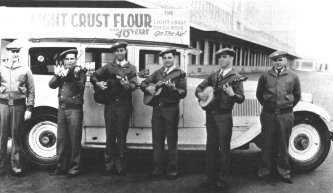 name
to the Aladdin Laddies. At this time the band had been extended
to a quintet with Clifton "Sleepy" Johnson playing
tenor banjo and then guitar when Arnspiger left the band
in the early part of 1932. The show ran for about a year
when it was taken over by an even bigger sponsor, Burrus
Mill and Elevator Company. Billed as the Light Crust Doughboys,
they advertised the companies Light Crust Flour on air.
Although the band 1was highly popular, Wilbert Lee O'Daniel,
President of the company (later US Senator and Texas Governor
in 1939) sacked them after only two weeks, saying they were
too Hillbilly. KFJZ kept the band on air without sponsorship
until O'Daniel realised the bands popularity and resumed
sponsorship. name
to the Aladdin Laddies. At this time the band had been extended
to a quintet with Clifton "Sleepy" Johnson playing
tenor banjo and then guitar when Arnspiger left the band
in the early part of 1932. The show ran for about a year
when it was taken over by an even bigger sponsor, Burrus
Mill and Elevator Company. Billed as the Light Crust Doughboys,
they advertised the companies Light Crust Flour on air.
Although the band 1was highly popular, Wilbert Lee O'Daniel,
President of the company (later US Senator and Texas Governor
in 1939) sacked them after only two weeks, saying they were
too Hillbilly. KFJZ kept the band on air without sponsorship
until O'Daniel realised the bands popularity and resumed
sponsorship.
Milton Brown left the band in September 1932 to form
his own band, The Musical Brownies and was replaced by Thomas
Elmer Duncan as vocalist and piano player. In 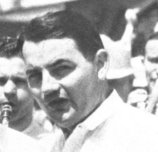 1933
Bob Wills was fired by O'Daniel for a combination of reasons,
especially due to his indulgence in a little drink and the
fact that it had caused Wills to miss a couple of shows.
Tommy Duncan told Bob "You hired me, O'Daniel didn't,
anywhere you go, I'm gonna go and I'm not leaving until
you fire me." The Playboys were conceived, with Tommy
Duncan, Kermit Whalin on steel and bass, Bob's brother Johnny
Lee on tenor banjo and June Whalin playing rhythm guitar.
Some 15 years later Tommy was sacked by Wills and replaced
by Jack Lloyd. Tommy formed his own band Tommy Duncan &
His Western All Stars. Some ten years later Bob and Tommy
reunited and recorded three albums together for Liberty.
Sadly Tommy Duncan died of a heart attack at the age of
57 in 1967. 1933
Bob Wills was fired by O'Daniel for a combination of reasons,
especially due to his indulgence in a little drink and the
fact that it had caused Wills to miss a couple of shows.
Tommy Duncan told Bob "You hired me, O'Daniel didn't,
anywhere you go, I'm gonna go and I'm not leaving until
you fire me." The Playboys were conceived, with Tommy
Duncan, Kermit Whalin on steel and bass, Bob's brother Johnny
Lee on tenor banjo and June Whalin playing rhythm guitar.
Some 15 years later Tommy was sacked by Wills and replaced
by Jack Lloyd. Tommy formed his own band Tommy Duncan &
His Western All Stars. Some ten years later Bob and Tommy
reunited and recorded three albums together for Liberty.
Sadly Tommy Duncan died of a heart attack at the age of
57 in 1967.
Due to pressure applied by O'Daniel, The Playboys were
precluded from working on radio in Texas; therefore Bob
moved his band to Oklahoma City by the beginning of 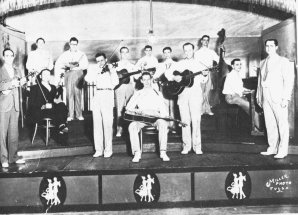 1934
and secured a show with WKY with the additions of Everett
Stover playing trumpet, pianist Don Ivey and Bob's cousin
Son Lansford playing fiddle and for the first time called
themselves "Bob Wills & His Texas Playboys".
Here O'Daniel contrived to have the band ousted and Wills
and his band moved again, this time to Tulsa, playing the
midnight slot on KVOO and making Tulsa their home. Even
though O'Daniel tried to bring pressure to bare once again,
Bob Wills & Texas Playboys stayed with the station until
1942 when the war caused members of the band to sign up
for the services. In 1935 Bob introduced horn and reed instruments,
though were always seen essentially as a fiddle band, Bob
Wills and Texas Playboys were signed up with Brunswick and
recorded their session in September which included 'Osage
Stomp' and a fiddle tune Bob had 1934
and secured a show with WKY with the additions of Everett
Stover playing trumpet, pianist Don Ivey and Bob's cousin
Son Lansford playing fiddle and for the first time called
themselves "Bob Wills & His Texas Playboys".
Here O'Daniel contrived to have the band ousted and Wills
and his band moved again, this time to Tulsa, playing the
midnight slot on KVOO and making Tulsa their home. Even
though O'Daniel tried to bring pressure to bare once again,
Bob Wills & Texas Playboys stayed with the station until
1942 when the war caused members of the band to sign up
for the services. In 1935 Bob introduced horn and reed instruments,
though were always seen essentially as a fiddle band, Bob
Wills and Texas Playboys were signed up with Brunswick and
recorded their session in September which included 'Osage
Stomp' and a fiddle tune Bob had 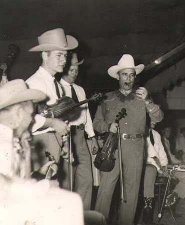 written
in 1927 "Spanish Two Step". Over the next few
years the band had a turnover of musicians that read like
a Who's Who. Wills brought in several jazz fiddle players
such as Jesse Ashlock, Louis Tierney, Joe Holley and Johnny
Gimble alongside names such as Zeb McNally, and Leon McAuliffe
with his electrified steel guitar. Others were Alton Stricklin
described by Bob as "the old piano pounder" (took
over piano from Tommy Duncan), Herman Arnspiger, Joe Ferguson
and Smokey Dacus who introduced drums to country music.
Tommy Duncan's voice was as smooth as silk which he skilfully
used to caress his audience and Eldon Samblin (formally
of the Alabama Boys) brought with him the electric guitar.
Tiny Mott, Lon Lansford and Sleepy Johnson were expected
by Wills to bring innovation and originality into the band.
Bob's daughter Rosetta Wills says; "Guy Logsdon, University
of Tulsa professor, claimed that Oklahoma had more dance
halls than any other state." "Logsdon written
in 1927 "Spanish Two Step". Over the next few
years the band had a turnover of musicians that read like
a Who's Who. Wills brought in several jazz fiddle players
such as Jesse Ashlock, Louis Tierney, Joe Holley and Johnny
Gimble alongside names such as Zeb McNally, and Leon McAuliffe
with his electrified steel guitar. Others were Alton Stricklin
described by Bob as "the old piano pounder" (took
over piano from Tommy Duncan), Herman Arnspiger, Joe Ferguson
and Smokey Dacus who introduced drums to country music.
Tommy Duncan's voice was as smooth as silk which he skilfully
used to caress his audience and Eldon Samblin (formally
of the Alabama Boys) brought with him the electric guitar.
Tiny Mott, Lon Lansford and Sleepy Johnson were expected
by Wills to bring innovation and originality into the band.
Bob's daughter Rosetta Wills says; "Guy Logsdon, University
of Tulsa professor, claimed that Oklahoma had more dance
halls than any other state." "Logsdon 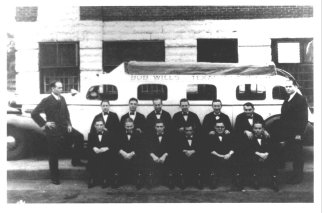 maintained
that bands like the Playboys were responsible for development
of the electric Fender solid-body bass and solid-body rhythm
guitar. In the late forties Bob became friends with Californian
Leo Fender, who built steel guitars and amplifiers. Fender
gave amps and prototypes to Eldon Shamblin and Herb Remington
to road-test on tours." maintained
that bands like the Playboys were responsible for development
of the electric Fender solid-body bass and solid-body rhythm
guitar. In the late forties Bob became friends with Californian
Leo Fender, who built steel guitars and amplifiers. Fender
gave amps and prototypes to Eldon Shamblin and Herb Remington
to road-test on tours."
1938 Columbia bought Brunswick and Bob Wills recordings
were released on the Okeh subsidiary. "Spanish Two
Step" was virtually played backwards and the fiddle
tune was given the name 'San Antonio Rose' by record producer
Art Satherley, selling well and became a regular number
in the bands repertoire. In 1940 Bob Wills put words to
the music, calling the song 'New San Antonio Rose' which
the band 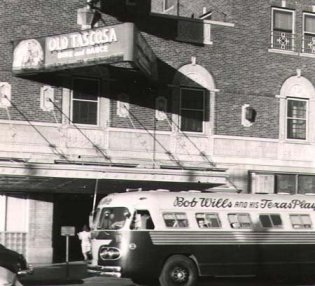 recorded
and soon became their most popular number, hitting the country
and pop charts and now recognised as a country standard.
At the same recording session the instrumental 'Bob Wills
Special', was also recorded and the last number the band
recorded before breaking up due to the Second World War
was 'Lil Liza Jane' in 1942. Many of the band members enlisted
in the services and Bob Wills joined up in late 1942, but
was discharged in 1943. recorded
and soon became their most popular number, hitting the country
and pop charts and now recognised as a country standard.
At the same recording session the instrumental 'Bob Wills
Special', was also recorded and the last number the band
recorded before breaking up due to the Second World War
was 'Lil Liza Jane' in 1942. Many of the band members enlisted
in the services and Bob Wills joined up in late 1942, but
was discharged in 1943.
Due to his popularity over many years, Bob Wills was
held in high esteem as the King of Western Swing. Throughout
the post-war years Bob Wills & His Texas Playboys were
somewhat reduced in size, concentrating more on string instruments,
than the horns of the Tulsa days. In 1943 Monte Mountjoy
joined the Texas Playboys on drums. Monte says; "Bob
was definitely the father of his musical family, and he
took care of 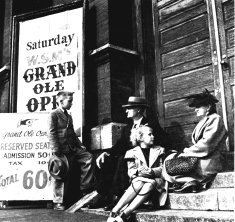 us
like we were his children. We were hired to play the Grand
Ole Opry in Nashville, not knowing that they did not allow
drums there. Well we showed up and when I started carrying
in my drums, all hell broke loose. They told Bob the band
could play - but the drummer couldn't! He told them that
if I didn't play, the whole band wouldn't play; so finally
they said I could play behind curtains. I started setting
up my drums behind the curtain. Bob watched 'til I was finished
- then said "Get them moved." Nobody had to ask
'What'? We moved the drums in front of the curtain and because
of Bob, I became the first man to ever play a full set of us
like we were his children. We were hired to play the Grand
Ole Opry in Nashville, not knowing that they did not allow
drums there. Well we showed up and when I started carrying
in my drums, all hell broke loose. They told Bob the band
could play - but the drummer couldn't! He told them that
if I didn't play, the whole band wouldn't play; so finally
they said I could play behind curtains. I started setting
up my drums behind the curtain. Bob watched 'til I was finished
- then said "Get them moved." Nobody had to ask
'What'? We moved the drums in front of the curtain and because
of Bob, I became the first man to ever play a full set of
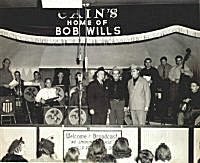 drums
on the Grand Ole Opry." drums
on the Grand Ole Opry."
In 1944 the Texas Playboys had as many as 22 members
playing with horn players from the bands of Jimmy Dorsey
and Glen Miller. Sadly the band never recorded in this format
and lasted only a few months, mainly due to many of the
band members working strictly to union rules, not wanting
to travel and making it impossible to comply with the demands
that Bob wanted to impose. It was not until 1945 that Bob
Wills & His Texas Playboys recorded several sides for
Columbia, but did record for Armed Forces Services Transcription
service between October 1943 and December 44, which were
broadcast over the "Melody Round-Up" show. At
this time the Texas Playboys 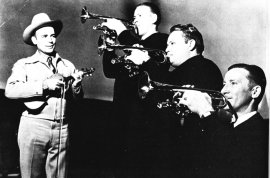 consisted
of steel guitarists Les "Carrot Top" Anderson
and Noel Boggs, Jesse Ashlock, Louis Tierney, Joe Holley
and Buddy Raye on fiddle, Rip Ramsey and Teddy Adams on
bass, Tiny Mott on sax, jimmy Wyble, Dick Hamilton on guitars,
Millard Kelso on piano, Alex Brashear and Chuck Mackey on
trumpet, Monte Mountjoy and Howard Davis on drums with Tommy
Duncan and Laura Lee Owens on vocals. Bob Wills and The
Texas Playboys started recording transcription discs for
the Tiffany Music Company and between 1946-47 Bob Wills
& His Texas Playboys made over 370 recordings. consisted
of steel guitarists Les "Carrot Top" Anderson
and Noel Boggs, Jesse Ashlock, Louis Tierney, Joe Holley
and Buddy Raye on fiddle, Rip Ramsey and Teddy Adams on
bass, Tiny Mott on sax, jimmy Wyble, Dick Hamilton on guitars,
Millard Kelso on piano, Alex Brashear and Chuck Mackey on
trumpet, Monte Mountjoy and Howard Davis on drums with Tommy
Duncan and Laura Lee Owens on vocals. Bob Wills and The
Texas Playboys started recording transcription discs for
the Tiffany Music Company and between 1946-47 Bob Wills
& His Texas Playboys made over 370 recordings.
In 1950 Bob recorded his famous song "Faded Love"
for MGM Records in California. 15 year old Tommy Perkins
was playing drums with the Texas playboys at this time and
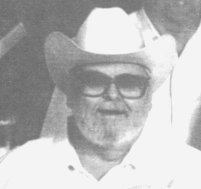 says
in the biography of singer Leon Rausch; I was still in school
and I had to get special permission from the Lieutenant
Governor, James E. Barry, to leave school for a month to
six weeks to do this tour to California and back. Sadly
Tommy died in June 2003 after suffering a heart attack while
driving home after performing with the Texas Playboys at
the Legends Of Western Swing Festival, Texas. Tommy died
from injuries suffered in the car crash (no other vehicle
was involved). says
in the biography of singer Leon Rausch; I was still in school
and I had to get special permission from the Lieutenant
Governor, James E. Barry, to leave school for a month to
six weeks to do this tour to California and back. Sadly
Tommy died in June 2003 after suffering a heart attack while
driving home after performing with the Texas Playboys at
the Legends Of Western Swing Festival, Texas. Tommy died
from injuries suffered in the car crash (no other vehicle
was involved).
In 1955/56 Bob Wills recorded in Nashville, though most
of his recording was in California. In 1959 the Texas Playboys
appeared for a two-week gig at the Showboat and followed
by a lucrative contract at the Golden Nugget in Las Vegas.
Rosetta quotes her father, "We have wonderful crowds,
just stack `em in at the Golden 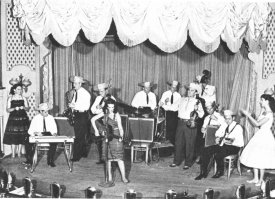 Nugget,
but no western music is being played on the radio stations
these days. But I'm proud of our crowds. That's proof enough
our music isn't dead". Nugget,
but no western music is being played on the radio stations
these days. But I'm proud of our crowds. That's proof enough
our music isn't dead".
With Tommy Duncan back in the fold in 1960-61 Bob &
His Texas Playboys recorded over 40 sides for Liberty. In
1962 Wills suffered a heart attack and in 1964 had a second
heart attack. Bob was inducted into the Country Music Hall
Of Fame in 1968, but in 1969 Bob suffered a stroke and underwent
two major operations, but was left paralysed on his right
side and in 1971 Bob had another stroke on the left side.
In 1973 Bob made a few appearances and even held his fiddle
while Hoyle Nix used the bow. He travelled to Dallas to
attend a 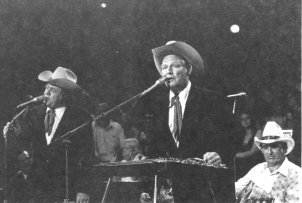 recording
session of the reunion album Bob Wills And The Texas Playboys
For The Last Time, when he included a few 'hollers' while
the band recorded several of his hits. Sadly during the
night Bob suffered a further stroke and remained unconscious
for almost 18 months until his death on 13 May 1975. recording
session of the reunion album Bob Wills And The Texas Playboys
For The Last Time, when he included a few 'hollers' while
the band recorded several of his hits. Sadly during the
night Bob suffered a further stroke and remained unconscious
for almost 18 months until his death on 13 May 1975.
Leon Rausch was lead vocalist and bass player with the
Texas Playboys from St Patrick's Day 1958 untill 1961. In
1965 due to Bob's illness, Leon took over the Texas Playboys
as manager-coordinator and vocalist. After Bob's death his
widow Betty Wills made the decision to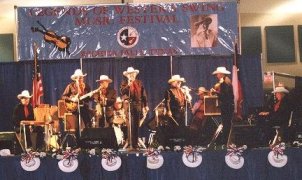 reform The Texas Playboys, who reorganised as The Original
Texas Playboys under the direction of Leon McAuliffe, performing
together for eleven years. The band made several appearances
on the TV show Austin City Limits and received the 'Instrumental
Group Of The Year' award from the CMA in 1977. In 1986 Al
Stricklin became ill and died in the October. The band agreed
to honour all remaining dates and then call it quits. The
band didn't come to an end here!!! Leon Rausch and Tommy
Allsup purchased the name Bob Wills' Texas Playboys from
Betty Wills and continue the legacy that Bob Wills started
back in 1930.
reform The Texas Playboys, who reorganised as The Original
Texas Playboys under the direction of Leon McAuliffe, performing
together for eleven years. The band made several appearances
on the TV show Austin City Limits and received the 'Instrumental
Group Of The Year' award from the CMA in 1977. In 1986 Al
Stricklin became ill and died in the October. The band agreed
to honour all remaining dates and then call it quits. The
band didn't come to an end here!!! Leon Rausch and Tommy
Allsup purchased the name Bob Wills' Texas Playboys from
Betty Wills and continue the legacy that Bob Wills started
back in 1930.
|


![]()